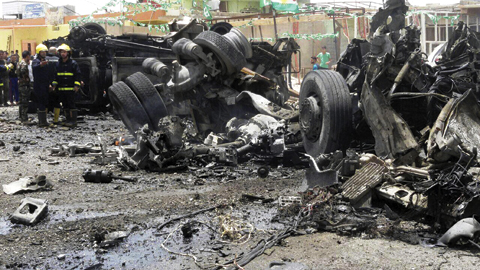 TUZ KHORMATO, Iraq: Iraqi security forces gather at the site of a suicide truck bomb attack yesterday. Despite being under attack in Iraq and Syria, Islamic State group extremists retaliated with this suicide truck bomb attack near the office of a Kurdish group in northern Iraq. — AP
TUZ KHORMATO, Iraq: Iraqi security forces gather at the site of a suicide truck bomb attack yesterday. Despite being under attack in Iraq and Syria, Islamic State group extremists retaliated with this suicide truck bomb attack near the office of a Kurdish group in northern Iraq. — APFALLUJAH: Iraqi forces hunted down holdout jihadists in Fallujah yesterday after retaking the city center and trained their sights on Mosul, the Islamic State's last remaining major hub in the country. While not fully under government control yet, Fallujah is the latest in a string of battlefields losses for IS, which has seen its two-year-old "caliphate" shrink significantly in recent months. Prime Minister Haider Al-Abadi on Friday declared Fallujah retaken after the national flag was raised over the main government compound but IS fighters still hold most northern neighborhoods.
Elite Iraqi forces "are continuing their progress in the liberation of neighborhoods in northern Fallujah," Lieutenant General Abdulwahab Al-Saadi, the overall commander of the operation, told AFP. Forces led by the police of Anbar province, where Fallujah is located, were meanwhile combing reconquered southern neighborhoods for pockets of IS fighters and explosive devices, he said.
Abadi announced the recapture of the city of Ramadi, the capital of Anbar, in December but the security forces only established full control over the city in February. Saadi and other commanders said Iraqi forces faced only limited resistance during the major advance that saw them push into the heart of Fallujah and clinch a breakthrough in the four-week-old operation. Security sources said IS fighters have been slipping out of the city by blending in with civilians fleeing the fighting.
IS's retreat in Fallujah sparked what the Norwegian Refugee Council described as "an unprecedented tidal wave of mass displacement from Fallujah". It said late Friday that up to 20,000 people fled the city in just a few hours. Footage on social media showed hundreds of people swimming across the Euphrates to reach safety. "It is unknown how many families are still trapped inside Fallujah but we are concerned they are the most vulnerable - pregnant women, elderly people, people with disabilities," the NRC said.
Aid groups have been warning for days they would be overwhelmed by the flow of displaced and were running low on funding and supplies to respond to the humanitarian crisis. Building on the momentum of the Fallujah operation, Iraq announced yesterday that joint Kurdish-federal forces were starting a new phase in the push on Mosul from the south.
Mosul Next
"We started at 5:00 am (0200 GMT) the second phase of the liberation of Nineveh," Defence Minister Khaled Al-Obeidi told AFP. "The target of the operation is to take Qayyarah and make it a launchpad for Mosul," Obeidi said. Qayyarah, which has an airfield, lies across the River Tigris from the main base for pro-government forces in the Kurdish-controlled area of Makhmur. It is some 60 km south of Mosul.
Abadi ignored US advice to focus on Mosul last month when he declared the launch of the Fallujah operation but he vowed on Friday that the liberation of the northern city was "very near". The embattled premier has promised that IS would be defeated nationwide by the end of 2016 but an ongoing offensive in Nineveh province, of which Mosul is the capital, has achieved only modest gains so far.
Fallujah, where US forces suffered some of their worst losses since the Vietnam War, looms large in modern jihadist mythology but Mosul is much larger. Patrick Martin, Iraq analyst with the Institute for the Study of War, argued that IS could survive the loss of Fallujah. "The ISIS (IS) messaging machine will likely find ways to continue attracting recruits and encouraging lone wolf attacks despite the loss of Fallujah," he said.
The jihadist group, which has recorded few military successes on home turf lately and grabbed more headlines for claiming attacks in the West, now faces major offensives on its Syria de facto capital Raqqa and on Mosul. "Mosul and Raqqa could be very different battles since when they fall the delusions of holding a caliphate completely fall away," said Patrick Skinner, an analyst with the Soufan Group. - AFP










